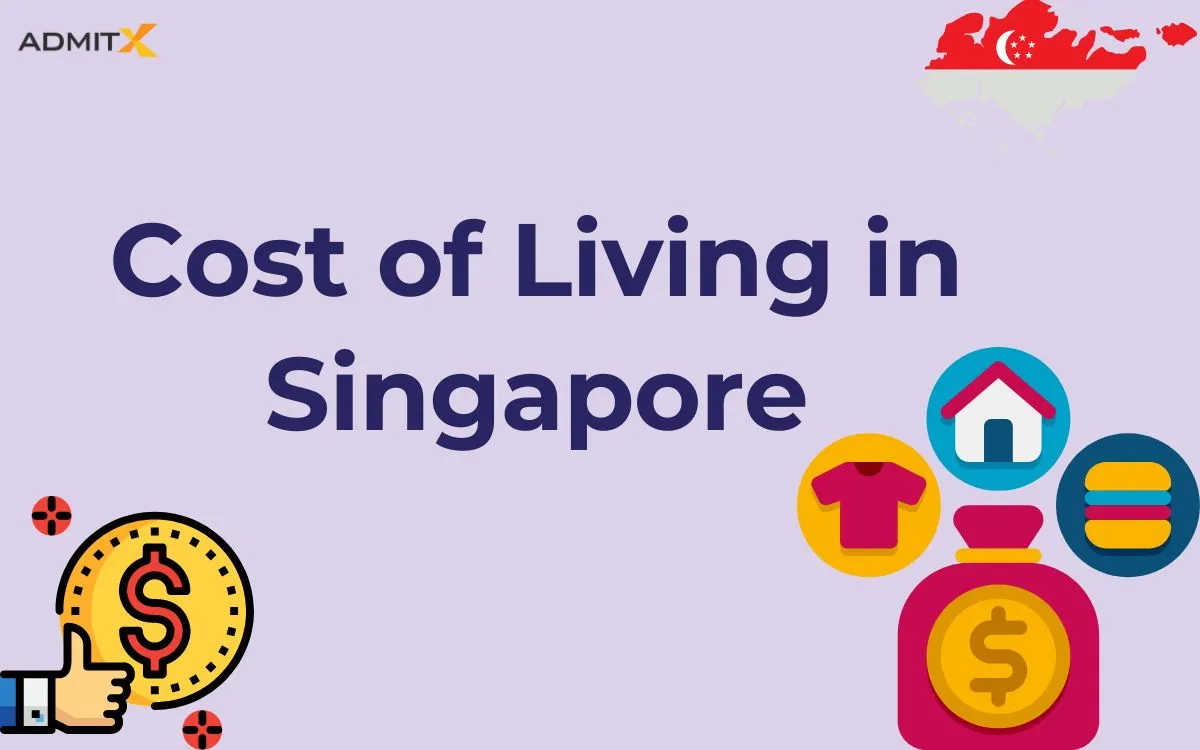
Cost of Living in Singapore for Indian Students
Singapore is characterized by its modern infrastructure, clean streets, and friendly residents. The Lion City is famously recognized as the global city of the future. Recently, Singapore has become an international frontrunner in research and innovation. Singapore is a contemporary urban centre boasting top-notch public facilities. Its advanced infrastructure and convenient amenities make it an ideal city. Singapore’s best facilities contribute to its reputation as one of the costliest cities globally.
Therefore, the average monthly expense of living in Singapore is generally high. As with many cities, the costs you face are influenced by different factors, like the universities you decide to enrol in, whether you live on campus or off-campus, or the neighbourhood you choose to live in. In this blog, you will learn the cost of living in Singapore for Indian students and how you can manage it.
Accommodation Costs in Singapore
The costs associated with housing and accommodation make up a substantial part of the typical cost of living in Singapore for Indian students. The high property and rental prices are due to the growing need for homes and the scarcity of land for development.
For individuals searching for rental properties, the average monthly expense in Singapore for an off-campus place is approximately SGD 565. In contrast, on-campus accommodation costs around SGD 550.
Typically, students find on-campus housing to be cheaper than off-campus alternatives. Nevertheless, living off-campus can offer more privacy and convenience. Here is an overview of the average rent in Singapore:
| Accommodation Type | Cost |
|---|---|
| Private Apartment (1-bedroom) | SGD 2429 ( INR 1 Lac) |
| Private Apartment (3-bedroom) | SGD 4725 (INR 2.9 Lac) |
| Landed Property | SGD 3300 (INR 2.3 Lac) |
| Condominium | SGD 3000 (INR 1.85 Lac) |
Cost of Living in Singapore for Indian Students: Food
Your daily cost of living in Singapore also encompasses the funds needed for food purchases. Choosing meal plans within SGD 90 to 120 per month is the most effective way to reduce spending on food. However, meal options can differ; your university canteen might also offer some meals with an estimated monthly cost of around SGD 250 to 350. Naturally, the expenses will vary if you reside off-campus and prepare meals independently. Here is the list of the costs for food:
| Type of Food | Cost |
|---|---|
| Restaurant Meal | SGD 15-49 (INR 927 – 3K) |
| Groceries (per week) | SGD 49-97 (INR 3000-6000) |
| Food Court Meal | SGD 6- 9 ( INR 371 – 618) |
Cost of Living in Singapore: Transportation
The price of transportation in Singapore depends on the type of transportation used. A bus fare is usually approximately ₹67 for distances up to 3.2 km. The total monthly expenditure for bus and MRT travel does not exceed over ₹9,000. Taxis are cost-effective and start around ₹300, which makes them budget-friendly.
The total amount spent on monthly expenses like parking, petrol, and tolls is around ₹37,000, while annual maintenance costs can range from ₹31,000 to ₹62,000. Purchasing a new car can cost around ₹9,00,000. Here is an overview of transportation costs:
| Transport Type | Cost |
|---|---|
| Taxi | SGD 194.29-291 (12K – 18K) |
| Public Transport | SGD 64.75-113 (4K – 7K) |
| Car Ownership | SGD 1489-2913 (INR 92K- 1.8L) |
Also read – Masters in Singapore
Healthcare Insurance in Singapore
Singapore is known for its exceptional healthcare system, which is also cost-effective. Foreign residents can purchase health insurance to cover unforeseen medical costs. As a foreigner in Singapore, you may need to pay between SGD 920-5,015 annually for health insurance. Below is the healthcare cost which you can incur in Singapore:
| Type of Healthcare | Cost |
|---|---|
| Health Insurance | SGD 97.33- 291 ( INR 6K – 18K) |
| Private Hospital | SGD 194.68-486 (INR 12K – 30K) |
| Public Hospital | SGD 48.67-97.34 (INR 3K – 6K) |
Cost of Entertainment
Leisure and entertainment expenses can add up quickly in Singapore, as you will not always study and will have to search for places to hang out and refresh yourself. Here are the average monthly expenses in Singapore for leisure and entertainment activities
- Movies: SGD 20-30 (INR1,235 – 1,853)
- Gym Membership: SGD 49.98-99.96 (INR 3,088 – 6,176)
- Dining Out: SGD 99.96-199.91 (INR 6,176 – 12,352)
- Recreational Activities: SGD 49.58-99.96 ( INR 3,088 – 6,176)
Also read – Cost of Living Calculator
How to Reduce The Cost of Living In Singapore?
Here are specific tips to reduce the cost of living in Singapore for Indian students:
Accommodation: To significantly reduce your rent and overall living costs in Singapore, consider these strategies: first, find roommates to share a spacious HDB flat or apartment, splitting the rent and utilities. Look beyond central areas, where rents are lower. Finally, use online platforms to compare rental prices and find the best deals on your new Singapore home.
Grocery: Reducing your grocery budget in Singapore is about knowing where and how you shop. Here are some tips: Hit wet markets or local grocery stores for fresh and affordable produce. Consider using grocery delivery apps like Grocery Hero or HappyFresh to save time and compare prices while snagging deals. Finally, remember to take advantage of sales and discounts offered by major supermarkets like NTUC FairPrice, Giant, and Cold Storage.
Transportation: Ditch the car and use Singapore’s efficient public transport system. Utilize the MRT, buses, and even taxis for occasional trips to save on car ownership and maintenance costs. If you travel frequently, consider purchasing a monthly pass for unlimited rides on buses and MRTs. For shorter distances, bike-sharing services like Scoot or Mobike offer a convenient and budget-friendly option.
Health Insurance: Staying healthy in Singapore doesn’t have to break the bank. Start by taking advantage of the public healthcare system’s network of polyclinics and subsidized treatments at public hospitals. While private hospitals offer more amenities, public options are significantly more affordable. Consider purchasing health insurance to cover additional medical expenses and protect yourself further. Singapore offers free health campaigns and vaccinations, helping you stay healthy and avoid costly treatments.
Conclusion
Although the cost of living in Singapore for Indian students is slightly high, the quality of education it provides is unmatched. By following these tips, you can easily cut your average expenses in Singapore. Also, the government of Singapore is making significant efforts to mitigate the cost of living in Singapore by giving subsidies for housing and healthcare. However, suppose you are still facing issues in deciding whether Singapore is the right destination for you. In that case, you can visit AdmitX and contact us to solve your queries related to your study abroad journey.
FAQs
How much does a student earn while studying in Singapore?
A student can earn upto SGD 1,350 while working part-time to manage the cost of living in Singapore.
Are any financial aids available to Indian students to help them manage the cost of living in Singapore?
Yes, many scholarships and financial aid opportunities are available to students studying in Singapore. Government scholarships, university grants, and private scholarships from different organizations are all part of the options available. Scholarships commonly pay for tuition; some may also offer a stipend for living expenses. Financial aid initiatives aim to lessen the financial strain on students and increase the accessibility of education.
Do international students get jobs in Singapore?
Yes, international students get jobs in Singapore by working part-time for 16 hours and full-time during vacations.
If you are an aspirant looking to study at your dream university, book an appointment with AdmitX today and start your applications early to avail yourself of all the benefits.








